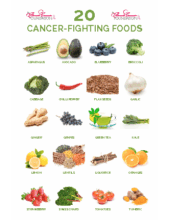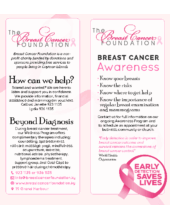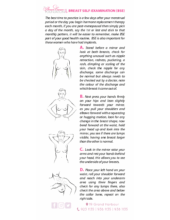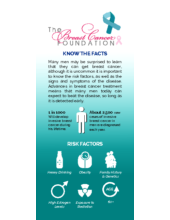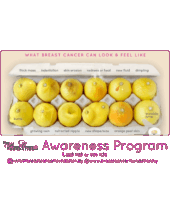Signs and Symptons

Click here for more information.
We here at the Breast Cancer Foundation are here to help YOU, so if you wish further information or help getting treatments or need to have a symptom checked out and do not know where to turn – call us or e-mail us today:
Early Detection – The Breast Self Exam
Breast Self-Exam (BSE) is a tool that may help you become familiar with the way your breasts normally look and feel. Knowing what is normal for you may help you see or feel changes in your breast(s). Most women will not get a regular mammogram before aged 40 (and men not at all), so it is vital that you get into a regular routine of self-examination at a young age, continuing this routine for life, most women under 40 find their own lump or symptom, so it is vital you keep on with your self-examinations. Male breast cancer is not as common but the mortality rate is higher that is because a lot of men do not realize they can get breast cancer and ignore any signs or symptoms until the cancer is well advanced.
Please click on the link to watch an easy guide to a self-examination, which we recommend should be done once per month, usually a week after your period or if post-menopause, simply pick a date each month that you can remember, such as the first or last).
Recommended Screening Guidelines
Mammography is getting better and more accurate; it is the most important screening test for breast cancer. A mammogram is an X-ray of the breast, it can detect breast cancer up to two years before the tumour can be felt by you or your doctor.
Talk to your doctor about how frequently you should be having a mammogram, usually they will start checking you on an annual or bi-annual basis at aged 40.
Women at average risk of breast cancer between the ages of 40-45 it is recommended that you have an annual mammogram, if your insurance does not cover you for one mammogram every year, you can contact us.
If you are told that you have ‘dense’ or ‘busy’ breasts, then our advice is to have an ultrasound alongside your usual mammogram.
Women at high risk should have yearly mammograms, ultrasounds and MRI’s each year starting at aged 30.
Some Risk Factors for Breast Cancer
The following are some of the known risk factors for breast cancer, however not all breast cancers can be linked to a specific cause, so please if in doubt or are worried, please consult your doctor about any specific risk(s) you may or may not have.
- Age – although there seems to be more younger woman (and men) being diagnosed with breast cancer, it is still the case that a bigger percentage of breast cancers are found in women over the age of 50, breast cancer in younger women is notoriously more aggressive so it is vital for all women (and men) to check themselves regularly and see help or further investigations where necessary.
- Personal history of breast cancer – A woman (or man) who has had breast cancer in one breast is at an increased risk of developing cancer in the other breast.
- Family History of Breast Cancer – A woman (or man) has a higher risk of breast cancer, especially younger women (and men) if they have had a mother, sister or daughter who has had breast cancer, and this risk goes up if the close relative was also young (under 40) at their diagnosis, having other relatives with a breast cancer history may also raise the risk, talk to your family find out your medical history.
- Genetic Factors – Women (and men) with certain genetic mutations, including changes to the BRCA1 and BRCA2 genes, are at a higher risk of developing breast cancer during their lifetime, other gene changes may raise breast cancer risks as well. Most insurance policies will cover this test if you are worried, please contact us for details on how to obtain this test.
- Childbearing and menstrual history – The older a woman is when she has her first child, greater her risk of developing breast cancer can be.
- Also at higher risk are – Women who menstruate for the first time before the age of 12, women who go through menopause late, (after aged 55) and women who have never had children.
Risk Factors We Can Control or Be Aware Of
- Obesity
- Lack of physical activity
- Alcohol
- Smoking
- Prior Radiation treatment to the chest area
- Hormone replacement therapy
You can reduce your risk if you are pregnant below the age of 30 and breastfeed, start menstruation after aged 12, and had menopause before 50.
Common Myths that DO NOT Cause Breast Cancer
- Wearing an underwire bra or wearing no bra
- Having an injury to the breast
- Drinking water from a warm plastic bottle
- Mobile phones
- Stress
- Antiperspirants
For any other queries relating to treatment here in Cayman, please e-mail or call us for more details.
